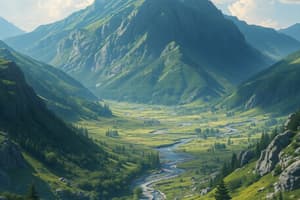Podcast
Questions and Answers
किस स्थल पर प्राकृतिक संसाधनों का वितरण किया जाता है?
किस स्थल पर प्राकृतिक संसाधनों का वितरण किया जाता है?
- भूगर्भ (correct)
- कृषि
- जल
- ऊर्जा
क्या पानी के संसाधन की वितरण में मुख्य भूमिका होती है?
क्या पानी के संसाधन की वितरण में मुख्य भूमिका होती है?
- कार्बन
- जलवायु (correct)
- समुद्री सतह
- पर्वतमाला
कौन सा क्षेत्र खानी संसाधनों के उपलब्धता, पहुंचने की सुविधा और उपयोगिता पर प्रभाव डालता है?
कौन सा क्षेत्र खानी संसाधनों के उपलब्धता, पहुंचने की सुविधा और उपयोगिता पर प्रभाव डालता है?
- जल
- ऊर्जा
- महत्वपूर्ण स्थल (correct)
- कृषि
कौन-सा कारक खेती संसाधनों के वितरण पर महत्वपूर्ण भूमिका निभाता है?
कौन-सा कारक खेती संसाधनों के वितरण पर महत्वपूर्ण भूमिका निभाता है?
संसाधन प्रबंधन क्या है?
संसाधन प्रबंधन क्या है?
किसमें संसाधनों के खनन, ड्रिलिंग, और कटाई शामिल है?
किसमें संसाधनों के खनन, ड्रिलिंग, और कटाई शामिल है?
किसे संसाधनों के प्रौद्योगिक उत्पादन, प्रसंस्करण, और प्रयोग का सही समय सुनिश्चित करना कहा जा सकता है?
किसे संसाधनों के प्रौद्योगिक उत्पादन, प्रसंस्करण, और प्रयोग का सही समय सुनिश्चित करना कहा जा सकता है?
मुक्ति प्रबंधन क्या है?
मुक्ति प्रबंधन क्या है?
कौन सी समस्या संसाधन महाजीरी पर महत्वपूर्ण प्रकटीकरण करती है?
कौन सी समस्या संसाधन महाजीरी पर महत्वपूर्ण प्रकटीकरण करती है?
Flashcards are hidden until you start studying
Study Notes
The Geography of Resources: A Comprehensive Guide
The distribution, management, and impact of natural resources shape our world in countless ways. In this article, we'll delve into the fascinating subject of the geography of resources—a discipline that examines these phenomena, focusing on natural resource distribution, resource management, and their economic and ecological implications.
Natural Resource Distribution
Resource distribution reveals the spatial patterns of minerals, water, energy, and agricultural materials across the globe. The distribution is driven by various factors such as geology, climate, and geographical features.
- Mineral resources: Metals and other minerals are unevenly distributed, forming geological provinces that govern their availability, accessibility, and exploitability.
- Water resources: Water is a fundamental resource, with its distribution determined by climate, topography, and geology. Freshwater resources are particularly unevenly distributed.
- Energy resources: Energy sources such as fossil fuels, nuclear fuels, and renewable energy are distributed unevenly, with certain regions benefiting from abundant reserves of oil, gas, coal, uranium, and renewable energy potential.
- Agricultural resources: Soil, water, and climate all play significant roles in determining the distribution of agricultural resources, such as arable land, forests, and fisheries.
Resource Management
Resource management is the deliberate effort to ensure the sustainable use of resources. Efficient management depends on understanding the dynamics of resource distribution, the needs of society, and the ability to develop technologies to extract, process, and utilize resources sustainably.
- Extraction and processing: The extraction of resources involves mining, drilling, and harvesting, while processing involves refining, manufacturing, and distribution.
- Efficient use: Efficient use of resources refers to the optimization of resource extraction, processing, and consumption.
- Waste management: Waste management is an essential aspect of resource management, encompassing the disposal or recycling of waste materials associated with the extraction, processing, and consumption of resources.
Impact of Resources on Economies
Natural resources play an integral role in economic development. Resource-rich countries can benefit from mining, drilling, and agricultural industries, but they must also navigate the challenges of resource extraction and the consequences of economic reliance on a single resource.
Some key aspects include:
- Trade and commerce: Natural resources are often traded internationally, affecting global trade patterns and shaping the economies of resource-rich countries.
- Employment and income: Resource extraction and processing industries can create jobs and provide income opportunities for local communities.
- Growth and development: Natural resources can contribute to economic growth and development, but they must be managed sustainably to ensure long-term benefits.
Sustainable Resource Use
The sustainable use of resources is a critical goal for societies to ensure the long-term viability of natural resources and to mitigate the environmental and social consequences of resource extraction.
Some aspects of sustainable resource use include:
- Environmental stewardship: Ensuring the protection of ecosystems, habitats, and biodiversity is a key component of sustainable resource use.
- Waste reduction: Reducing waste and promoting recycling and reuse are essential aspects of sustainable resource use.
- Resource efficiency: Improving resource efficiency through the development of new technologies, methods, and processes can help reduce resource use and waste.
Conflict over Resources
Conflict over resources is a reality in many parts of the world. Competition for land, water, minerals, and energy sources can lead to tensions and conflicts between communities, states, and nations.
- Inter-state conflicts: Conflicts over resources can occur between neighboring states, with tensions often arising from the shared use of water resources, mineral deposits, and fisheries.
- Intra-state conflicts: Conflicts over resources can also occur within states, often resulting from competition for land, water, and minerals.
In conclusion, understanding the geography of resources and the underlying factors that govern the distribution, management, and impact of natural resources is essential for fostering sustainable development, promoting environmental stewardship, and avoiding conflicts over resources. As resource-dependent societies navigate the challenges and opportunities that lie ahead, the importance of this discipline will only continue to grow.
Studying That Suits You
Use AI to generate personalized quizzes and flashcards to suit your learning preferences.




